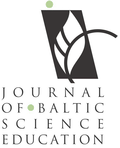SECONDARY SCHOOL STUDENTS’ PERCEPTIONS OF SCIENCE LEARNING ENVIRONMENT AND SELF-EFFICACY IN SOUTH KOREA: GENDER DIFFERENCES
| Title | SECONDARY SCHOOL STUDENTS’ PERCEPTIONS OF SCIENCE LEARNING ENVIRONMENT AND SELF-EFFICACY IN SOUTH KOREA: GENDER DIFFERENCES |
| Publication Type | Journal Article |
| Year of Publication | 2023 |
| Authors | Kim, SY, Alghamdi, A. K. H. |
| Journal | Journal of Baltic Science Education |
| Volume | 22 |
| Issue | 2 |
| Start Page | 269-281 |
| Pagination | Continuous |
| Date Published | April/2023 |
| Type of Article | Original article |
| ISSN | 1648-3898 |
| Other Numbers | E-ISSN 2538-7138 |
| Keywords | constructivist pedagogy, science learning environment, secondary students, self-efficacy, students’ metacognition |
| Abstract | This study examined students’ perceptions of their science learning environment and how it relates to their metacognition and self-efficacy. An exploratory study (N=186 South Korean secondary science students from a large-city urban school) used two instruments: Outcomes-Based Education Learning Environment Questionnaire [OBLEQ]; Self-Efficacy and Metacognition Learning Inventory-Science [SEMLI-S]). Descriptive and inferential statistics revealed that that Korean students’ mean score of science learning environment was 2.98, representing male students scored highest on Involvement (M=3.24), while female students scored highest on Cooperation (M=3.00). In addition, regarding students’ perceptions on their self-efficacy and metacognition learning in science, the mean score of SEMLI-S was 3.16, with both male and female students’ highest score on Learning Risks Awareness (3.34 and 3.25 respectively). Further, the students’ perceptions on science learning environment predicted students’ metacognition and self-efficacy. The Investigation subscale, which emphasizes processes of inquiry, was the dominant predictive factor for both male and female students’ self-efficacy and metacognition. The subscale Involvement was the next best significant predictor of male students’ metacognitive orientation. Personal Relevance, Responsibility for Own Learning, and Differentiation filled that role for female students. |
| URL | https://oaji.net/articles/2023/987-1681286935.pdf |
| DOI | 10.33225/jbse/23.22.269 |
| Refereed Designation | Refereed |
| Full Text |
